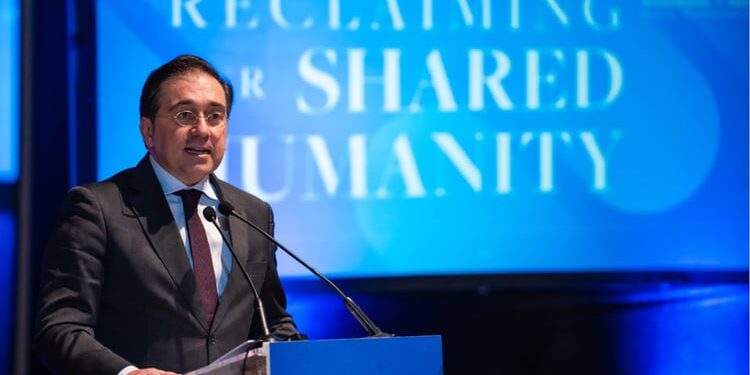The Diplomat
The Spanish Government made an appeal on Saturday to the parties to restrain themselves and to avoid an escalation of violence, after the latest attacks launched by Israel against military installations in Iran.
In a statement issued by the Ministry of Foreign Affairs, it is stated that, after the aforementioned attacks, “the Government of Spain asks for restraint from the parties and reiterates its call to stop the escalation and halt the increase in violence, which seriously endanger the stability of the Middle East.”
“It is necessary and urgent – the statement adds – to put an end to the crisis in the Middle East with an immediate ceasefire in Gaza and Lebanon, massive aid to deal with the humanitarian catastrophe, the release of the hostages, as well as strict compliance with International Law and International Humanitarian Law. Only a diplomatic solution can return stability to the region.”
Finally, it indicated that “Spain maintains its commitment to the restoration of stability to pave the way for peace, and will continue to work towards this objective with our partners.”
The Minister of Foreign Affairs, José Manuel Albares, spoke along the same lines, calling for an end to the “cycle of violence that is engulfing” the Middle East, during the opening session of the Euro-Mediterranean Civil Society Conference, which brought together more than 200 participants from 30 countries in Barcelona with the aim of seeking shared ways to advance towards peace.
In front of the representatives of civil society and experts gathered at the event, promoted by the European Institute of the Mediterranean and the European Union (EU), the minister defended the decision of the Spanish Government to recognise Palestine as a State, “from the certainty – he said – that it was the time to do so, as a matter of justice with the Palestinian people.”
After insisting on the “need, more than ever, to respect international law,” he insisted that “the first objective is to put an end to the atrocious humanitarian suffering after a year of slaughter and war in Gaza.” Albares again demanded an immediate ceasefire in the area, as well as the release of all hostages and the distribution of humanitarian aid.
The minister added that Spanish foreign policy is also focused on putting an end to the humanitarian situation created by the massive bombings in highly populated areas of Lebanon, which have cost hundreds of dead and wounded, and more than 1.2 million displaced.
For his part, the Secretary General of the Union for the Mediterranean (UfM), Nasser Kamel, warned that the Euro-Mediterranean region is facing a “critical moment” in its history.
“If we allow ourselves to be consumed by hatred, we sacrifice not only the future, but our shared identity,” said Kamel, who defended the need to promote common efforts to guarantee security in “Lebanon, Israel and Palestine.”
“Anti-Semitism, as well as the dehumanisation of Palestinians and Lebanese, are interconnected phenomena that create an environment of mistrust,” said the Egyptian diplomat, highlighting the key role of civil society in creating new narratives that emphasise “shared humanity” in the Middle East.
The EU Special Representative for the Middle East Peace Process, Sven Koopmans, insisted on the need to curb the rise of anti-Semitism and anti-Islamism, while warning of the dangers that terrorism inspired by current conflicts can pose.
The EU’s main priority is to “end suffering, hunger and despair”, but also to “tackle the root of the problem”, said Koopmans.
After stating that two states are the only way out of the conflict, he said: “Whoever tells us that it is not yet time for a two-state solution, that we must wait for better circumstances, I ask them: how many more people have to die for us to think that it is the right time?”
The role of disinformation on social networks and the media in igniting conflicts and fostering polarization was the focus of part of the opening speeches at the conference in Barcelona, Efe reports.
“Investing in education and digital literacy, empowering our citizens, especially young people, to evaluate digital information is the best defense against disinformation,” said Albares.
Collaboration between civil society and technology companies to develop strategies against hate speech, while preserving freedom of expression, is key to fighting polarization, added the minister







